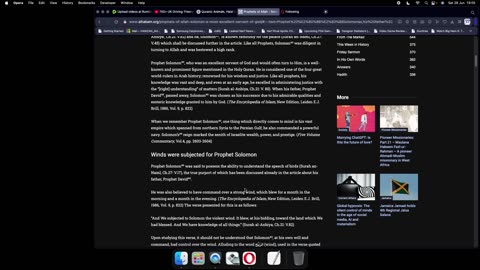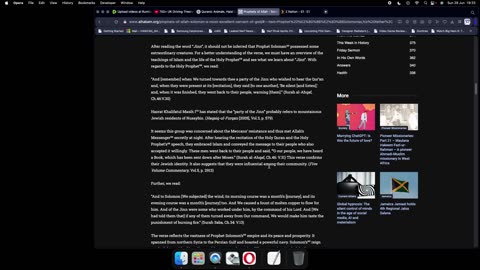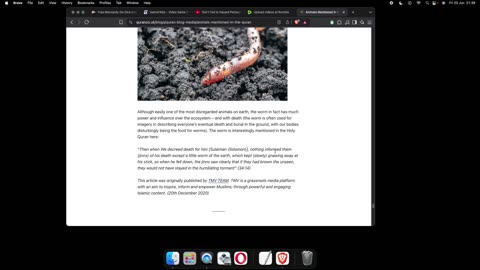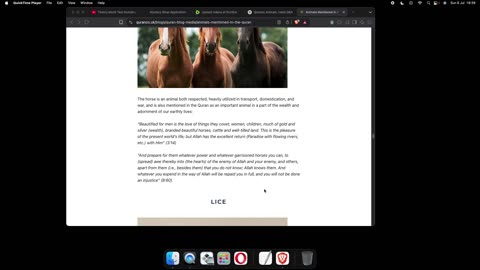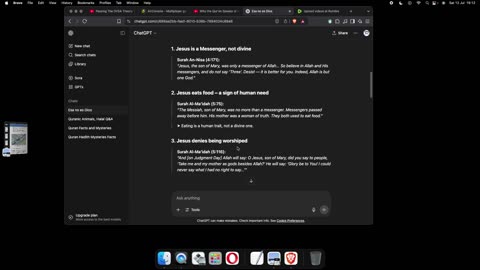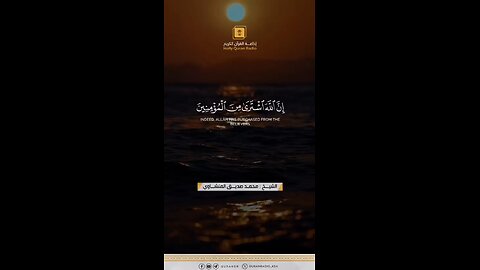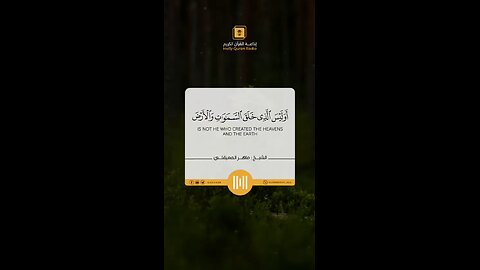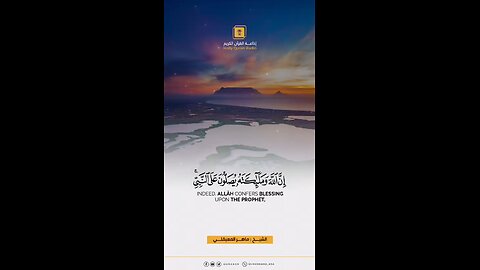-
Prophets of Allah – Solomon: A most excellent servant of God
 Haz55Prophet Solomonas, also known as Sulayman [سليمان], was a Prophet of Allah and the son of Prophet Davidas. He was the heir of Davidas and was bestowed special knowledge and, as all prophets, was favoured by Allah the Almighty. His people carried trade on sailing boats (Surah al-Anbiya’, Ch.21: V.82) and he, Solomonas, is known famously for the palace (Surah an-Naml, Ch.27: V.45) which shall be discussed further in the article. Like all Prophets, Solomanas was diligent in turning to Allah and was bestowed a high rank. Prophet Solomonas, who was an excellent servant of God and would often turn to Him, is a well-known and prominent figure mentioned in the Holy Quran. He is considered one of the four great world-rulers in Arab history; renowned for his wisdom and justice. Like all prophets, his knowledge was vast and deep, and even at an early age, he excelled in administering justice with the “[right] understanding” of matters (Surah al-Anbiya, Ch.21: V. 80). When his father, Prophet Davidas, passed away, Solomonas was chosen as his successor due to his admirable qualities and esoteric knowledge granted to him by God. (The Encyclopedia of Islam, New Edition, Leiden E.J. Brill, 1986, Vol. 9, p. 822) When we remember Prophet Solomonas, one thing which directly comes to mind is his vast empire which spanned from northern Syria to the Persian Gulf; he also commanded a powerful navy. Solomon’sas reign marked the zenith of Israelite wealth, power, and prestige. (Five Volume Commentary, Vol.4, pp. 2603-2604) Winds were subjected for Prophet Solomon Prophet Solomonas was said to possess the ability to understand the speech of birds (Surah an-Naml, Ch.27: V.17), the true purport of which has been discussed already in the article about his father, Prophet Davidas. He was also believed to have command over a strong wind, which blew for a month in the morning and a month in the evening. (The Encyclopedia of Islam, New Edition, Leiden E.J. Brill, 1986, Vol. 9, p. 822) The verse presented for this is as follows: “And We subjected to Solomon the violent wind. It blew, at his bidding, toward the land which We had blessed. And We have knowledge of all things.” (Surah al-Anbiya, Ch.21: V.82) Upon studying this verse, it should not be understood that Solomonas, at his own will and command, had control over the wind. Alluding to the word الرّيْح (wind), used in the verse quoted above, Hazrat Khalifatul Masih Ira has explained that this probably refers to Prophet Solomon’sas vessels which sailed under his command. (Haqaiq-ul-Furqan [2005], Vol. 3, p. 133) It implies that his people carried on trade in sailing boats. Hazrat Musleh-e-Maudra states that “Hazrat Solomon’sas vessels used to come down with goods from the upper region of Syria; that is, towards Palestine.” (Tafsir-e-Saghir, p. 417)44 views 1 comment
Haz55Prophet Solomonas, also known as Sulayman [سليمان], was a Prophet of Allah and the son of Prophet Davidas. He was the heir of Davidas and was bestowed special knowledge and, as all prophets, was favoured by Allah the Almighty. His people carried trade on sailing boats (Surah al-Anbiya’, Ch.21: V.82) and he, Solomonas, is known famously for the palace (Surah an-Naml, Ch.27: V.45) which shall be discussed further in the article. Like all Prophets, Solomanas was diligent in turning to Allah and was bestowed a high rank. Prophet Solomonas, who was an excellent servant of God and would often turn to Him, is a well-known and prominent figure mentioned in the Holy Quran. He is considered one of the four great world-rulers in Arab history; renowned for his wisdom and justice. Like all prophets, his knowledge was vast and deep, and even at an early age, he excelled in administering justice with the “[right] understanding” of matters (Surah al-Anbiya, Ch.21: V. 80). When his father, Prophet Davidas, passed away, Solomonas was chosen as his successor due to his admirable qualities and esoteric knowledge granted to him by God. (The Encyclopedia of Islam, New Edition, Leiden E.J. Brill, 1986, Vol. 9, p. 822) When we remember Prophet Solomonas, one thing which directly comes to mind is his vast empire which spanned from northern Syria to the Persian Gulf; he also commanded a powerful navy. Solomon’sas reign marked the zenith of Israelite wealth, power, and prestige. (Five Volume Commentary, Vol.4, pp. 2603-2604) Winds were subjected for Prophet Solomon Prophet Solomonas was said to possess the ability to understand the speech of birds (Surah an-Naml, Ch.27: V.17), the true purport of which has been discussed already in the article about his father, Prophet Davidas. He was also believed to have command over a strong wind, which blew for a month in the morning and a month in the evening. (The Encyclopedia of Islam, New Edition, Leiden E.J. Brill, 1986, Vol. 9, p. 822) The verse presented for this is as follows: “And We subjected to Solomon the violent wind. It blew, at his bidding, toward the land which We had blessed. And We have knowledge of all things.” (Surah al-Anbiya, Ch.21: V.82) Upon studying this verse, it should not be understood that Solomonas, at his own will and command, had control over the wind. Alluding to the word الرّيْح (wind), used in the verse quoted above, Hazrat Khalifatul Masih Ira has explained that this probably refers to Prophet Solomon’sas vessels which sailed under his command. (Haqaiq-ul-Furqan [2005], Vol. 3, p. 133) It implies that his people carried on trade in sailing boats. Hazrat Musleh-e-Maudra states that “Hazrat Solomon’sas vessels used to come down with goods from the upper region of Syria; that is, towards Palestine.” (Tafsir-e-Saghir, p. 417)44 views 1 comment -
Prophets of Allah – Solomon: A most excellent servant of God
 Haz55Further, we read: “And to Solomon [We subjected] the wind; its morning course was a month’s [journey], and its evening course was a month’s [journey] too. And We caused a fount of molten copper to flow for him. And of the Jinn were some who worked under him, by the command of his Lord. And [We had told them that] if any of them turned away from Our command, We would make him taste the punishment of burning fire.” (Surah Saba, Ch.34: V.13) The verse reflects the vastness of Prophet Solomon’sas empire and its peace and prosperity. It spanned from northern Syria to the Persian Gulf and boasted a powerful navy. Solomon’sas reign marked the zenith of Israelite wealth, power, and prestige. “The expression. ‘And of the jinn were some who worked under him’ shows that Solomonas had conquered and pressed into service wild and rebellious mountain tribes who worked for him day and night. Incidentally, the verse shows that Solomon’sas rule was firm and strong.” (Five Volume Commentary, Vol.4, pp. 2603-2604) Further, we read in the Bible that Prophet Solomonas built ships in Eziongeber on the Red Sea shore in Edom, and Hiram sent his skilled shipmen to join Solomon’sas servants on the fleet. (1 Kings 9:26-28) The Holy Quran states: “They made for him what he desired; palaces and statues, and basins like reservoirs, and large cooking vessels fixed in their places: ‘Work ye, O House of David gratefully;’ but few of My servants are grateful.” (Surah Saba’, Ch.34: V.14) In Surah al-Anbiya’ we read: “And [We subjected to him] deep divers who dived for him, and did other work beside that; and it was We Who guarded them.” (Surah Surah al-Anbiya’, Ch.21: V.83)11 views
Haz55Further, we read: “And to Solomon [We subjected] the wind; its morning course was a month’s [journey], and its evening course was a month’s [journey] too. And We caused a fount of molten copper to flow for him. And of the Jinn were some who worked under him, by the command of his Lord. And [We had told them that] if any of them turned away from Our command, We would make him taste the punishment of burning fire.” (Surah Saba, Ch.34: V.13) The verse reflects the vastness of Prophet Solomon’sas empire and its peace and prosperity. It spanned from northern Syria to the Persian Gulf and boasted a powerful navy. Solomon’sas reign marked the zenith of Israelite wealth, power, and prestige. “The expression. ‘And of the jinn were some who worked under him’ shows that Solomonas had conquered and pressed into service wild and rebellious mountain tribes who worked for him day and night. Incidentally, the verse shows that Solomon’sas rule was firm and strong.” (Five Volume Commentary, Vol.4, pp. 2603-2604) Further, we read in the Bible that Prophet Solomonas built ships in Eziongeber on the Red Sea shore in Edom, and Hiram sent his skilled shipmen to join Solomon’sas servants on the fleet. (1 Kings 9:26-28) The Holy Quran states: “They made for him what he desired; palaces and statues, and basins like reservoirs, and large cooking vessels fixed in their places: ‘Work ye, O House of David gratefully;’ but few of My servants are grateful.” (Surah Saba’, Ch.34: V.14) In Surah al-Anbiya’ we read: “And [We subjected to him] deep divers who dived for him, and did other work beside that; and it was We Who guarded them.” (Surah Surah al-Anbiya’, Ch.21: V.83)11 views -
Animal mentioned in Quran
 Haz55Throughout the Quran, Allah reminds us all about the role of animals on earth, their own duty towards Allah, and how we (as humans) should be aware of treating animals with kindness and respect as creations of Allah. There are more than 200 verses in the Quran that mention animals, and six chapters are also dedicated to an animal: Surah Al Baqarah (The Cow), Surah Al Anaam (The Cattle), Surah Al Nahl (The Bees), Surah Al Naml (The Ants), Surah Al Ankabut (The Spider), and Surah Al Fil (The Elephant). Discover the Fascinating World of Animals Mentioned in the Quran in Our Exciting Brand New Book, Sulaiman's Safari! Below we have listed some of the animals mentioned in the Holy Quran, while acknowledging that Allah Knows Best as to why and how we acknowledge our shared existence with animals here on earth:5 views 1 comment
Haz55Throughout the Quran, Allah reminds us all about the role of animals on earth, their own duty towards Allah, and how we (as humans) should be aware of treating animals with kindness and respect as creations of Allah. There are more than 200 verses in the Quran that mention animals, and six chapters are also dedicated to an animal: Surah Al Baqarah (The Cow), Surah Al Anaam (The Cattle), Surah Al Nahl (The Bees), Surah Al Naml (The Ants), Surah Al Ankabut (The Spider), and Surah Al Fil (The Elephant). Discover the Fascinating World of Animals Mentioned in the Quran in Our Exciting Brand New Book, Sulaiman's Safari! Below we have listed some of the animals mentioned in the Holy Quran, while acknowledging that Allah Knows Best as to why and how we acknowledge our shared existence with animals here on earth:5 views 1 comment -
animal mentioned in th Quran
 Haz55Mentioned in the same verse as frogs, in line with Allah sending down a plague as a punishment, lice are mentioned in the Holy Quran here: “So We sent on them: the flood, the locusts, the lice, the frogs, and the blood (as a succession of) manifest signs, yet they remained arrogant, and they were of those people who were Mujrimun (criminals, polytheists, sinners, etc.).” (7:133) Lion The lion is mentioned once in the Quran, in relation to those with disbelief running from a giant fear or large prey they cannot flee—in this case, with the lion used as a parable. The lion is mentioned in the Holy Quran here: “So no intercession of intercessors will be of any use to them. Then what is wrong with them (i.e., the disbelievers) that they turn away from (receiving) admonition? As if they were frightened (wild) donkeys. Fleeing from a lion!” (74:48-51) Locusts The third animal mentioned in the Quran with frogs and lice as part of a punishment and plague, locusts are mentioned here: “So We sent on them: the flood, the locusts, the lice, the frogs, and the blood (as a succession of) manifest signs, yet they remained arrogant, and they were of those people who were Mujrimun (criminals, polytheists, sinners, etc.).” (7:133)21 views 1 comment
Haz55Mentioned in the same verse as frogs, in line with Allah sending down a plague as a punishment, lice are mentioned in the Holy Quran here: “So We sent on them: the flood, the locusts, the lice, the frogs, and the blood (as a succession of) manifest signs, yet they remained arrogant, and they were of those people who were Mujrimun (criminals, polytheists, sinners, etc.).” (7:133) Lion The lion is mentioned once in the Quran, in relation to those with disbelief running from a giant fear or large prey they cannot flee—in this case, with the lion used as a parable. The lion is mentioned in the Holy Quran here: “So no intercession of intercessors will be of any use to them. Then what is wrong with them (i.e., the disbelievers) that they turn away from (receiving) admonition? As if they were frightened (wild) donkeys. Fleeing from a lion!” (74:48-51) Locusts The third animal mentioned in the Quran with frogs and lice as part of a punishment and plague, locusts are mentioned here: “So We sent on them: the flood, the locusts, the lice, the frogs, and the blood (as a succession of) manifest signs, yet they remained arrogant, and they were of those people who were Mujrimun (criminals, polytheists, sinners, etc.).” (7:133)21 views 1 comment -
Jesus in the Qur’an
 Haz55Surah An-Nisa (4:171): “Jesus, the son of Mary, was only a messenger of Allah... So believe in Allah and His messengers, and do not say ‘Three.’ Desist—it is better for you. Indeed, Allah is but one God.” 2. Jesus eats food—a sign of human need Surah Al-Ma’idah (5:75): “The Messiah, son of Mary, was no more than a messenger. Messengers passed away before him. His mother was a woman of truth. They both used to eat food.” ➤ Eating is a human trait, not a divine one. 3. Jesus denies being worshipped. Surah Al-Ma’idah (5:116): “And [on Judgment Day] Allah will say, ‘O Jesus, son of Mary, did you say to people, “Take me and my mother as gods besides Allah?” He will say, ‘Glory be to You! I could never say what I had no right to say…’”30 views
Haz55Surah An-Nisa (4:171): “Jesus, the son of Mary, was only a messenger of Allah... So believe in Allah and His messengers, and do not say ‘Three.’ Desist—it is better for you. Indeed, Allah is but one God.” 2. Jesus eats food—a sign of human need Surah Al-Ma’idah (5:75): “The Messiah, son of Mary, was no more than a messenger. Messengers passed away before him. His mother was a woman of truth. They both used to eat food.” ➤ Eating is a human trait, not a divine one. 3. Jesus denies being worshipped. Surah Al-Ma’idah (5:116): “And [on Judgment Day] Allah will say, ‘O Jesus, son of Mary, did you say to people, “Take me and my mother as gods besides Allah?” He will say, ‘Glory be to You! I could never say what I had no right to say…’”30 views -
-
-
-
Mystrey 's of the Quran pt 1
 Haz55Hi there this video about the word's begin in Alif lam mee and see other and with the mystery words also so tune in you know and relax also and thanks for watching and also following you know.32 views
Haz55Hi there this video about the word's begin in Alif lam mee and see other and with the mystery words also so tune in you know and relax also and thanks for watching and also following you know.32 views -
mystery of the Quran pt 2
 Haz55Hi there this explains that more that who compile this and name and date also and gathered the information and some Numerology also and showing by there detail and can stop read also and so hope you all well also.37 views 1 comment
Haz55Hi there this explains that more that who compile this and name and date also and gathered the information and some Numerology also and showing by there detail and can stop read also and so hope you all well also.37 views 1 comment
